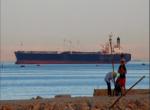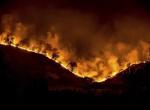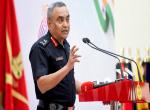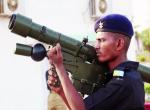Two small vessels, probably trawlers, slipped out of Keti Bandar, a small fishing port near Karachi and headed towards the Indo-Pak maritime border. The radio communications between these vessels and people on shore were intercepted by NTRO, which passed them on to the Coast Guard. Apprehensive of an operation similar to the one enacted by Pakistan in Mumbai on 26th November 2008 (26/11), in which 154 innocent people were butchered by ten terrorists, the Coast Guard immediately acted. One of the boats was seen by an aircraft of the Coast Guard as it crossed the maritime border and thereafter a Coast Guard warship was dispatched to intercept it. Meanwhile the search for the second vessel continued, but it mingled with other fishing boats and is suspected to have turned back towards Pakistan. The vessel in question was intercepted, asked to halt, two warning shots fired over its bow, but the vessel did not stop. It was chased and ultimately overtaken at about 23:30 hours on the night of 31st December 2014. The crew of the vessel briefly appeared on deck, but quickly went inside again and blew up the vessel. There was a loud explosion which indicated that the boat carried explosives.
On 11th September 2001 (9/11), two passenger aircraft were taken over by terrorists in the United States and the pilots were forced to crash into the Twin Towers in New York. About four thousand people died in this incident. Simultaneously two other aircrafts were taken over by terrorists, one was forced to hit the Pentagon in Washington, causing several casualties and the pilot of the fourth aircraft, in a rare case of selfless patriotism, preferred to cash the aircraft in an open field, rather than allow the aircraft to be turned into a living bomb. The United States government declared that it would wage a global war against terror and would also strengthen the United Stated security set up to the extent where another attack of the 11th September variety never took place. Entry point security was made watertight and rules were framed whereby security forces were given the authority to intercept, intervene, arrest and conduct searches even without a warrant. The questioning, profiling and intrusive searches at entry points are so thorough that they can be extremely annoying. Anyone who looks a Middle Easterner, has a beard or a Muslim name is liable to even more exhaustive questioning and searches. Our permanent representative to the United Nations (Ambassador), Hardeep Singh Puri, a Sikh, was asked to remove his turban and treated in a way which normally is not done with a diplomat. Similarly, Meera Shankar, our Ambassador to the United States, was physically searched despite her telling the security staff that she was our Ambassador and should not be subjected to such humiliation. This did not cut much ice with the security staff. The US Government apologises, but neither makes restitution nor in any way has relaxed the security rules in this behalf. In the United States everyone, regardless of position or social status, is treated exactly the same way at airports and the people have to appreciate that all this is being done in the interest of their safety. Certainly the fact that a 9/11 type of attack has never occurred in the United States is because of the security regime in that country. Of course in Israel the security arrangements are even stricter, but one can understand that a country which lives in the midst of hostile Arab nations is bound to be paranoid about its security and, therefore, Israel is number one in the world in security at airports.
We Indians are very status conscious, have overinflated egos and take insult at small things. We consider being questioned by security personnel to be an insult, a search to be even more of an insult, standing in a security queue to be infra dig and we all want to be included in the list of VIPs who are exempted from passing through the security arrangements. A jawan on duty at an airport, railway station or seaport has clear-cut orders regarding passengers and others seeking entry to produce proof of identity, authorisation of entry such as a flight ticket and with instructions about questioning and search of the persons seeking entry. Generally the security personnel are quite polite, but if a passenger is being obdurate, the security personnel have to take suitable action. Instead of cooperating, many of us take umbrage and sometimes this can lead to ugly scenes. Do these people not realise that by demoralising a security officer doing his duty we are weakening the system and jeoparadising security?
We have unfortunately exempted a large number of persons from the normal security procedures adopted at airports, etc. The list even includes such private persons as the son-in-law of Sonia Gandhi, Robert Vadra, his wife and children. Members of Parliament tried to have the rules amended to include themselves amongst the exempted persons. What is not realised is that a person who is otherwise exalted may come under some hidden pressures, including blackmail, to carry a weapon into a secured area or to otherwise facilitate commission of an offence which can jeopardise lives. The purpose of the security protocol is to ensure that neither wittingly nor unwittingly should any person carry into a secured area any item which might be used as a weapon. For example, there is a restriction on the amount of liquid one can carry into a secured area because explosive substances in liquid form are also available. A person who is searched would be detected if he had more than the permitted quantity of liquid in his possession. A person who is not searched could become a carrier of such harmful substance because he would pass through undetected. Can we afford to take such risks? What if the exempted person’s mobile telephone has been replaced by a device which could cause an explosion? If he were to pass through the normal search procedure the device would be detected and detained. Not searching him can facilitate the entry of such dangerous substances into a secured area. That is the logic of the search at the airports and other entry and exit points. Not everyone who carries harmful material into a secured area is a terrorist or a guilty person, but he can be used as a carrier either on his volition or because he does not know that he is carrying dangerous material That is why exempting anyone from passing the security points without following the security protocol is in itself dangerous.
The list of persons exempted from normal security search must be drastically pruned. The President, Vice President, Prime Minister, Speaker of Parliament, Chief Justice of India and the Governors and Lieutenant Governors of States, the three Service Chiefs when travelling on duty should be the only persons exempted from search. The Defence Minister and Home Minister when travelling on official work and accompanied by their authorised security personnel may also be so exempted, but not when travelling on private work. Everyone else, including the Chief Minister of a State and judges of the Supreme Court and High Courts, must pass through the normal security barriers. The security personnel may be specially instructed to be extra polite to such highly placed people, but should not relax the normal practice of search as prescribed by the instructions given by the government. The hurt ego of an individual can always be assuaged, but a security lapse which causes casualties can never be condoned.
The spokesperson of the Congress Party has asked government to present proof that the sunk boat was in fact a terrorist vessel. That is exactly what the Pakistanis are saying. Why should government produce proof? Even in matters of national security, is the Opposition insisting that government has to prove its own bona fides for action taken by the security forces? What does the Congress want from those who are required to guard our borders? The United States, which has land borders with friendly nations towards the north and south and which in the east and west has large oceans which must be crossed to reach the United States, nevertheless takes precautions which are not less than those which would be adopted in a situation of belligerency. India is much less insulated than the United States and it has long hostile borders on the land. Perhaps in international law India and Pakistan do not share a state of belligerency, but for all practical purposes Pakistan has no hesitation in allowing terrorist groups who target India to pass through the Pakistani lines. Therefore, both by land and sea we have to guard against intruders from that country. This is as good a definition of the belligerency as may have been given by Lauterpacht or Oppenheimer. We do have intruders from across the borders whose intentions are to create trouble in India. If the actions of an intruder appear to be suspicious or in any way hostile, the doctrine has to be to shoot first and then ask questions. This is not a case to be covered by Chapter IV of the Indian Penal Code, the General Exceptions. Under normal circumstances even the police, if it causes death except when ordered to disperse an unlawful assembly, has to show that it acted in the right of private defence. In the case of an intruder from outside India, we are dealing with an act which may amount to belligerency and here the rules of war apply. If you cannot identify yourself as a friend or you do not obey an order to halt, then the Indian security forces have every right to take extreme action, including causing your death. There is no question of the Coast Guard having to explain to the Congress spokesperson or to anyone else why action was taken against the intruding vessel.
After 26/11, any vessel coming from Pakistan has to be treated with suspicion and action against
it has to be applauded rather than called into question.
Published Date: 16th March 2015, Image source: http://im.rediff.com
(Disclaimer: The views and opinions expressed in this article are those of the author and do not necessarily reflect the official policy or position of the Vivekananda International Foundation)






.jpg)


Post new comment